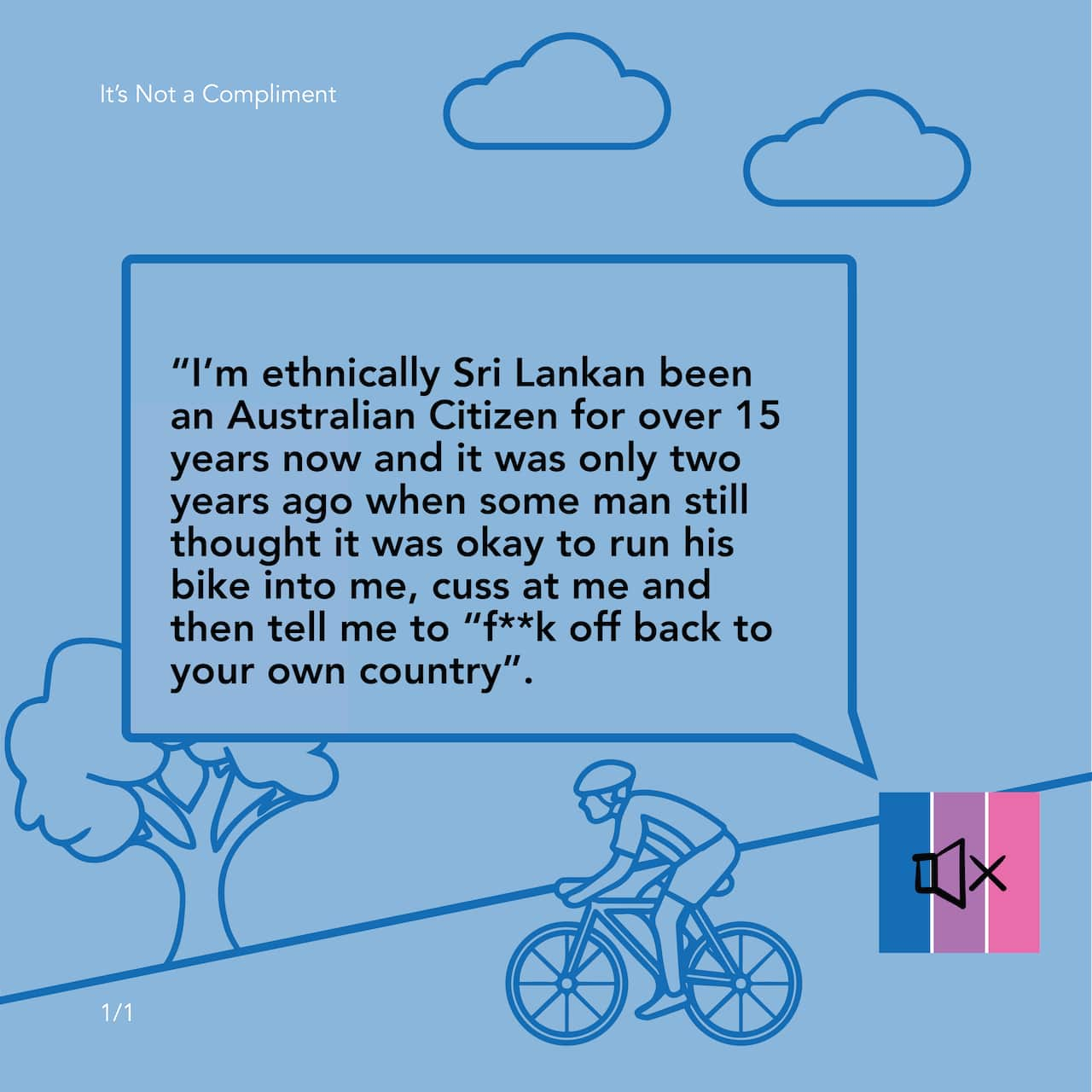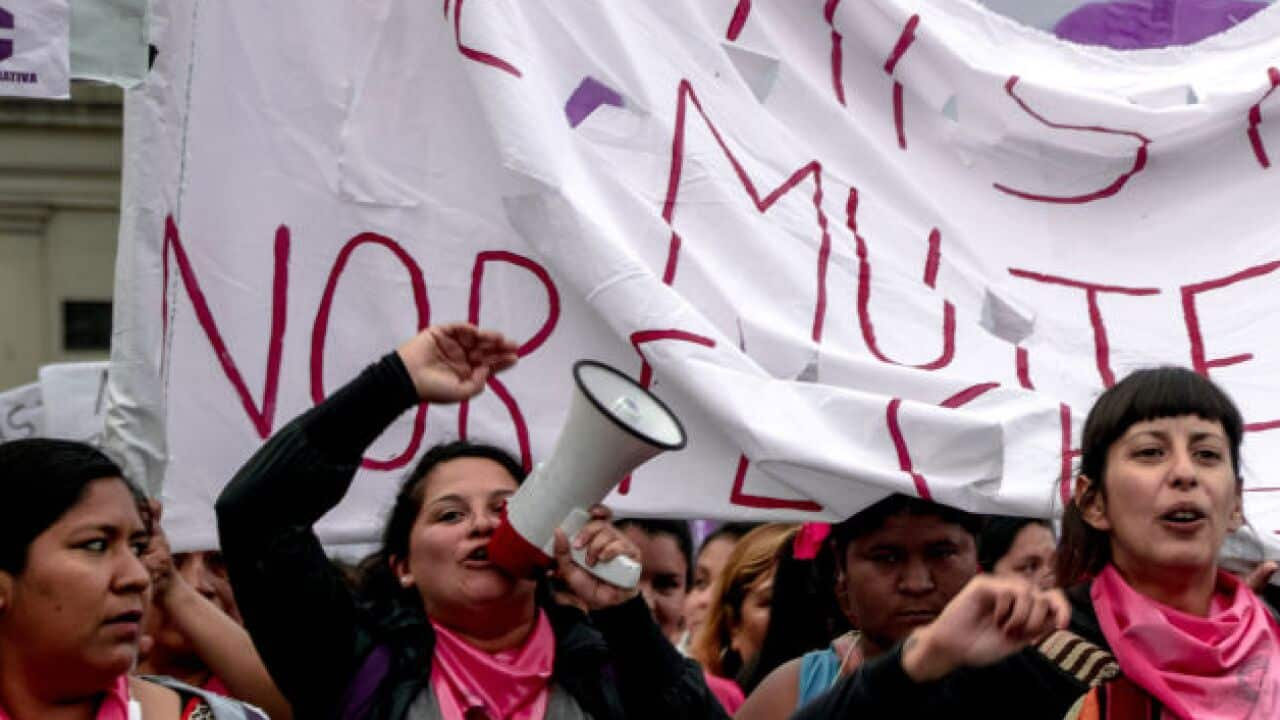“I don’t want your opinion on my body,” says the slogan on the rubbish truck slowly moving through the streets of Buenos Aires. “I don’t want to know what you’d like to do to me” is the message embossed on another.
For porteños, residents of Argentina's capital city, these are reminders that women experience public space differently to men. It’s October 2nd, the city’s annual Anti-Street Harassment Day; time to remind everyone that, for the last five years, street harassment has been illegal.
According to Law 5742, passed in 2015, street harassment spans comments of a sexual nature, unwanted photography, unwarranted physical touch, following someone, and indecent exposure. The law was intended to protect people’s liberty to enjoy public space, equally.
And then nothing happened.
When Agustina Señorans started as Director of the Department of Women in 2017 (she is now Adviser to the Minister of Public Space and Urban Hygiene), there had been precisely one report of street harassment in the city.
“Just because you have something enshrined in law, it doesn’t mean people’s behaviour changes,” she explains over Zoom from her home in Buenos Aires.
That first case occurred almost by accident. A twenty-five-year-old woman was being chased by a taxi driver shouting abuse. She ran into a policeman, who explained to her that that behaviour was now illegal. She had been unaware.
“It became a symbolic case because she could identify him,” Señorans explains. In this case, there was a fine and also mediation. Counselling was also available, and retraining for the perpetrators. But overall, women were reluctant to press charges. “We had to understand that by the time a woman asks the state for help, it’s too late,” says Señorans. “The woman has already suffered some form of violence, had to recognise herself as a victim, and find the internal strength to seek help.”
“We had to understand that by the time a woman asks the state for help, it’s too late,” says Señorans. “The woman has already suffered some form of violence, had to recognise herself as a victim, and find the internal strength to seek help.”

Agustina Señorans was the spokesperson for the government campaign against harassment toward women. Source: Supplied
For the law to have any effect there needed to be empathy with women’s experiences.
Initially, public transport was recognised as a key area where women experienced trauma. “There’s 3 million of us living here, plus another 3 million who commute in every day. It’s on public transport where you can feel your absolute loneliest, after someone’s touched you and no-one’s said anything, and you’re pressed like a sardine in a carriage,” says Señorans.
Women rely on public transport more than men, a fact evidenced by ‘She Moves Safely’, a report from the Development Bank of Latin America, which used data gathered by the cities of Buenos Aires, Quito and Santiago. It made it clear that women did not feel safe on public transport, but were pushed by their gender roles to use it more than men.
According to the report, 72 per cent of women felt insecure on public transport in Buenos Aires and could pass on this fear to their own children. Upon having children, women took 13 per cent more trips on public transport, compared to no change for men in the city. A 2016 study by The Movement of Women of the Motherland of Latin America revealed that 100 per cent of women in Buenos Aires had suffered street harassment, and that it started as young as 9 years old. Seventy per cent of victims participating in the study had their appearance commented on, 37 per cent had a man expose themselves, and 29 per cent were touched inappropriately.
A 2016 study by The Movement of Women of the Motherland of Latin America revealed that 100 per cent of women in Buenos Aires had suffered street harassment, and that it started as young as 9 years old. Seventy per cent of victims participating in the study had their appearance commented on, 37 per cent had a man expose themselves, and 29 per cent were touched inappropriately.

'I don't care about what you'd like to do to me,' reads a poster by Buenos Aires local government. Source: Supplied
Outrage at the continued dominance of sexist, or machista, culture is embodied by the feminist group Ni Una Menos (Not One Woman Less), formed after the murder of Chiara Páez, a pregnant fourteen-year-old found mutilated at her boyfriend’s home in 2015. Ni Una Menos has spread across Latin America, combatting male violence and the social blind eye.
“The street harassment law comes out of the same context as Ni Una Menos,” says Señorans, “We had the tools, but women were not reporting their harassment”. Conversely, within the city’s government, there was a clear shift from the conservative government that passed the law initially, to a more progressive approach.
“So, we decided to look at how to start conversations, to talk about this form of violence against women which is still contested by men (as a limit on their freedoms), and gather statistics to further the debate. If 100 per cent of women have experienced it, then they need to see themselves represented, not doubted,” points out Señorans.
The result was a government advertising campaign in 2018 that centred on believing women, supporting them, and producing information.
“I’m not mad, nor paranoid, nor hysterical. Street harassment is real,” read the posters across trains, buses, subways, and social media. A text number was provided to report gender-based violence in public spaces, and from there a bot would offer victims the opportunity to chat in real time with a psychologist.
It gathered data to effectively ‘heatmap’ the patterns of harassment in the city so that the government could respond with improved cameras, physical interventions, and safer vehicles. The bot gathered 4000 reports of harassment in its first year.
As spokesperson for the campaign, Señorans went on television to remind people that not all sexual harassment came from strangers. She had personal experience of this.
“It started when I was 12 years old. Around the corner from my family home there was a mechanic’s, and every time I passed the two men who worked there made comments about what I looked like that day, whether I was pretty, they came up close to talk to me,” she remembers.
“We didn’t talk about these things. I felt responsible. I did what women do in these situations; I changed my route and walked an extra four blocks every day. I did this all my life until I had daughters of my own and realised that those men were still there.”
Stories like Señorans’ are now considered part of the economic and psychological trauma of gender harassment. In Melbourne, It’s Not A Compliment is a small activist organisation that aims to break the silence.
“The goal is to break through the expectation that this is something that a huge part of the population goes through, and we just don’t talk about it,” says Annelise Lecordier, co-founder. This is supported by Plan International Australia, who surveyed 500 women in Sydney in 2020 and found 90 per cent don’t feel safe in the city at night.
Lecordier’s group hopes to change the culture of isolation and shame around harassment. It’s Not a Compliment offers bystander training sessions to encourage allyship. “This is about power and control. It’s about who gets to operate freely in public space,” says Lecordier.
Lecordier doesn’t see criminalisation as the answer to street harassment in Australia. “How good has the justice system been with dealing with issues of harassment and sexual assault?” she asks, rhetorically. Street harassment, in any country, starts at a young age. When the City of Buenos Aires’ Department of Women ran their own survey on street harassment in 2015, 90 per cent of women said they experienced it for the first time before they were 18, and almost 40 per cent before they were 13 years old. When It’s Not a Compliment gather stories via their social media community, the earliest example received was from someone who was 8 years old when first targeted.
Street harassment, in any country, starts at a young age. When the City of Buenos Aires’ Department of Women ran their own survey on street harassment in 2015, 90 per cent of women said they experienced it for the first time before they were 18, and almost 40 per cent before they were 13 years old. When It’s Not a Compliment gather stories via their social media community, the earliest example received was from someone who was 8 years old when first targeted.

Annelise Lecordier is the co-founder of 'It's Not a Compliment.' Source: Supplied
It’s Not a Compliment has worked with Girls’ Uniform Agenda to raise awareness of how many young girls first experience gender harassment in public space while they are wearing their school uniform. “It’s a really common experience, sadly,” says Lecordier. “It also helps keep things normalised because we internalise all the shame from that moment.”
Both Señorans and Lecordier are conscious that their arguments already resonate with women, especially urban liberal ones. They want freedom from harassment to be seen as everyone’s responsibility.
In Argentina, the Avon Foundation for Women produced a campaign where men held other men responsible for women’s rights. “Can’t you see that you’re scaring her?” one man says to his friend. Across the country, building sites now opt into announcing, “This is a no wolf-whistling building that respects women.” And, sometimes, that makes the news.
For any change to take place, government is crucial. In Buenos Aires that’s about consistency and awareness. “Each year, we have Anti-Street Harassment Day, to focus on getting as much media attention as we can, and insert ourselves again into the conversation. The challenge is keeping people talking about it, so that we can create change,” says Señorans. “As a government we have a responsibility to promote change and make it happen in five years, or ten, not in a century.”
“Each year, we have Anti-Street Harassment Day, to focus on getting as much media attention as we can, and insert ourselves again into the conversation. The challenge is keeping people talking about it, so that we can create change,” says Señorans. “As a government we have a responsibility to promote change and make it happen in five years, or ten, not in a century.”

An image from the campaign 'It's Not A Compliment.' Source: Supplied
What about the men who used to harass her as a 12-year-old? “I reported them,” she says, simply. “They were fined.”
Share
Dateline is an award-winning Australian, international documentary series airing for over 40 years. Each week Dateline scours the globe to bring you a world of daring stories. Read more about Dateline


